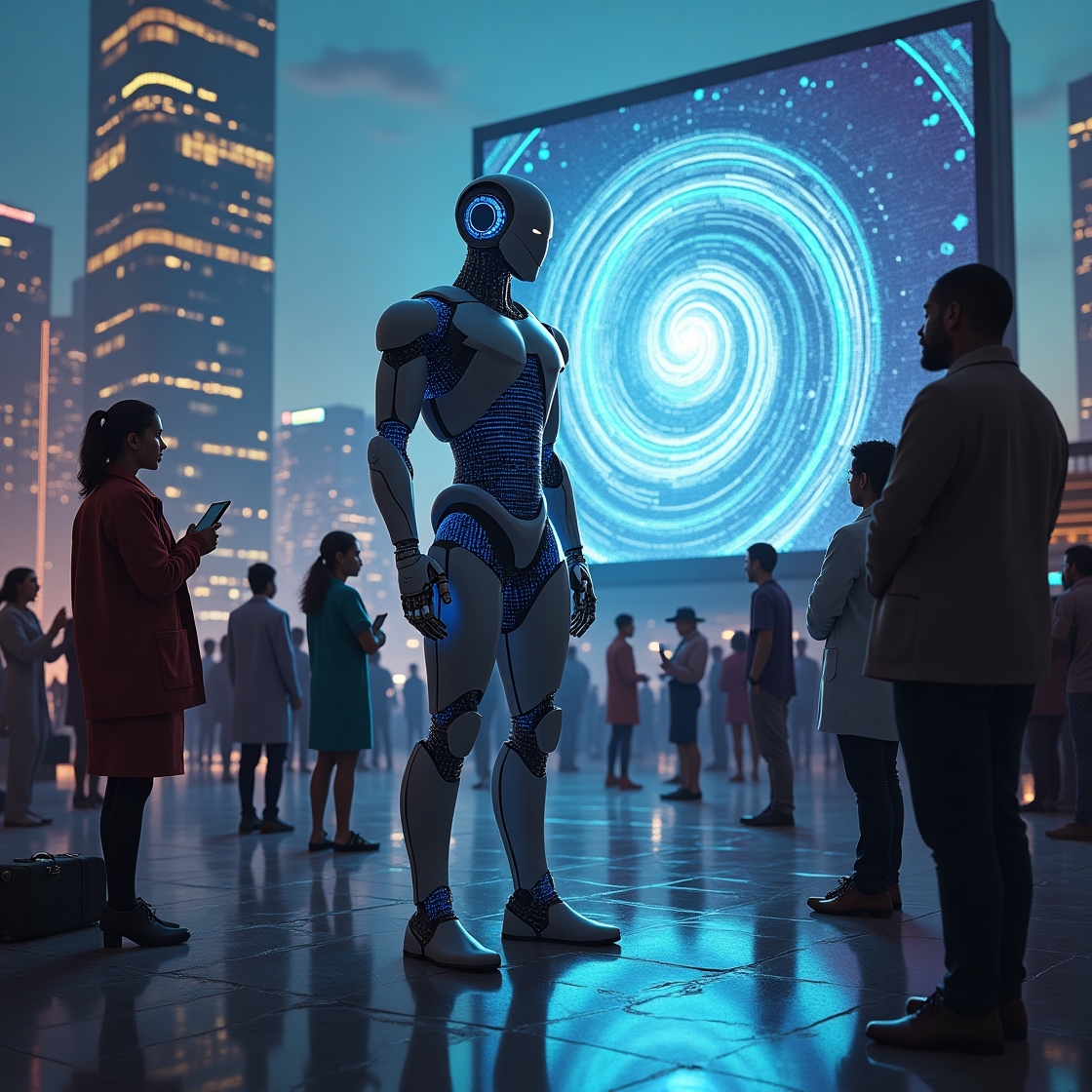<!-- x-tinymce/html -->
The Future of AI and Its Impact on Human Jobs
As we advance into an era characterized by rapid technological evolution, the emergence of artificial intelligence (AI) stands out as one of the most significant transformations we face today. Defined as the capability of a machine to imitate intelligent human behavior, AI is no longer confined to science fiction but has seamlessly integrated into various aspects of our lives and workplaces. Its advancements have propelled automation to the forefront, reshaping industries and raising crucial questions about job displacement, workforce transformation, and the ethics surrounding its deployment.
The AI Revolution
The future of AI is characterized by unprecedented advancements in machine learning, where algorithms are designed to learn from data and improve over time without explicit programming. From AI chatbots enhancing168073# The Future of AI and Its Impact on Human Jobs
As we venture further into the 21st century, the rapid advancements in artificial intelligence (AI) and automation are transforming the workforce landscape. The future of AI promises incredible innovations, yet it also raises questions about job displacement, workforce transformation, and the ethical implications of AI technology. Understanding these changes is crucial for preparing for an evolving job market and navigating the complexities of an AI-driven economy.
AI Advancements and Automation
AI technology has made significant strides in recent years, fueled by developments in machine learning, natural language processing, and robotics. Automation, powered by these advancements, is becoming prevalent in industries ranging from manufacturing to finance, healthcare, and customer service. This acceleration has led to concerns that jobs traditionally performed by humans may be supplanted by machines capable of doing them more efficiently.
According to a report by McKinsey & Company, approximately 375 million workers worldwide may need to change job categories by 2030 due to the advent of automation. Many roles, particularly those involving routine tasks, are susceptible to alteration or elimination. However, this should not be viewed solely as a threat. Instead, we are entering an era of workforce transformation, where AI can augment human capabilities rather than entirely replace them.
Job Displacement vs. Job Creation
Job displacement is a critical issue surrounding AI implementation. Many fear that automation will lead to significant unemployment, particularly in lower-skilled positions. Indeed, roles such as data entry, assembly line work, and168073The Future of AI and Its Impact on Human Jobs
As we stand on the brink of a technological revolution, artificial intelligence (AI) is at the forefront of a transformation that promises to redefine industries and labor markets worldwide. The advancements in AI, particularly within fields such as machine learning, are not merely incremental; they herald a paradigm shift that will significantly impact human jobs. This article explores the future of AI, its implications for job displacement and the workforce, while also addressing the ethical considerations surrounding this transition and the evolving nature of work.
The Advances in AI and Automation
AI technology is advancing at an unprecedented pace, enabling machines to perform tasks that once required human intelligence. From natural language processing to computer vision, the capabilities of AI are expanding, allowing for greater automation in sectors like manufacturing, healthcare, and customer service. Predictive analytics has improved drastically, guiding decision-making processes and intensifying the demand for machine learning algorithms that can learn from data and optimize performance over time.
Automation powered by AI is already altering workplace dynamics. Robots and intelligent systems are not just performing routine tasks; they are taking over complex operations that involve data analysis, critical thinking, and even creative processes. Companies are increasingly implementing AI-driven solutions for inventory management, fraud detection, and predictive maintenance,, raising both optimism and concern about the future workforce.
Job Displacement and Transformation
The transition to an AI-driven economy will undoubtedly lead to job displacement. According to a report by the World Economic Forum, it is projected that 85 million jobs may be displaced by 2025 due to the rise of AI and automation. However, this shift will also create new job opportunities that we have yet to fully envision.
Low-skilled jobs, particularly those that involve repetitive tasks, are more vulnerable to automation. Administrative roles, basic customer service positions, and manual labor are among the first to face significant change. However, this does not paint a complete picture. As automation takes over mundane tasks, new roles requiring higher levels of creativity, problem-solving, and interpersonal skills will emerge. Professionals skilled in AI development, data analysis, and digital transformation will be increasingly sought after.
Workforce Transformation and Upskilling
In the face of such changes, workforce transformation becomes crucial. Employers must invest in168073The Future of AI and Its Impact on Human Jobs
The rapid advancement of artificial intelligence (AI) technology continues to spark both excitement and concern regarding its future. As we venture deeper into this digital transformation era, the impact of AI on our workforce and job market becomes ever more pronounced. This article explores the trajectory of AI, its implications for job displacement, the evolution of the workforce, and the essential ethical considerations that accompany these innovations.
The Landscape of AI Advancements
AI technologies are advancing at an unprecedented pace. Techniques such as machine learning, natural language processing, and computer vision are becoming increasingly sophisticated. This evolution is not merely a trend but rather a paradigm shift in how industries operate, underpinned by vast amounts of data and remarkable computational power.
In sectors like manufacturing, logistics, finance, and healthcare, AI applications are enhancing productivity and efficiency. For example, predictive algorithms help businesses anticipate market trends, while AI-driven automation streamlines mundane tasks, allowing employees to focus on higher-level thinking and strategic initiatives. However, while these advancements promise greater productivity, they also raise critical questions about the nature of work and the future of jobs.
Automation and Job Displacement
As AI and automation technologies proliferate, the specter of job displacement looms large. Routine, repetitive tasks are increasingly being handled by machines, leading to concerns over the potential obsolescence of certain job roles. Reports suggest that up to 14% of jobs in some developed economies could be at risk due to automation in the near future. This disruption is particularly evident in sectors such as retail, where self-checkout systems and online shopping platforms have accelerated the decline of traditional retail jobs.
However, it is essential to balance these fears with the understanding that while some jobs may be lost, new roles are also being created. The AI economy is evolving, generating demand for positions related to AI development, data analysis, and ethical AI oversight. The essential challenge lies in ensuring that the workforce is adequately prepared for the transition.
Workforce Transformation
The future of work is characterized by a significant transformation of the workforce. As certain jobs become obsolete, the skills required in the marketplace will shift. A report by the World Economic Forum highlights that by 2025, 85 million jobs may be displaced, but 97 million new roles may emerge that are more adapted to the changing landscape.
To thrive in this new environment, the emphasis must shift towards developing skills that complement AI technologies, such as critical thinking, emotional intelligence, creativity, and adaptability. Education and training programs need to evolve to equip individuals with the necessary competencies to succeed in the AI-dominated workforce.
The Role of AI Ethics
As organizations increasingly integrate AI into their operations, ethical implications come to the forefront. Issues such as bias in algorithms, data privacy, and the accountability of AI systems must be addressed to ensure that the benefits of AI are realized without compromising human rights or dignity. The establishment of ethical guidelines and frameworks, such as those proposed by various AI ethics committees, is crucial in guiding responsible AI development.
Incorporating an ethical approach to AI not only fosters trust among users and employees but also enhances the long-term viability of AI technologies. Without ethical considerations, the potential for misuse of AI—be it through surveillance, discriminatory practices, or job displacement—poses a significant risk to society.
Future Jobs in an AI Economy
While automation may displace certain jobs, it also paves the way for the emergence of new professions. Anticipated roles in the AI economy include data curators, AI trainers, and AI ethicists, among others. Additionally, as AI systems handle more routine tasks, jobs requiring complex human interactions, such as those in healthcare, education, and creative fields, are likely to remain in high demand.
Moreover, the rise of remote work and digital platforms driven by AI enhances flexibility in the job market, enabling skills to be honed on a global scale. This not only broadens job opportunities for individuals but also fosters an interconnected global workforce.
Conclusion
The future of AI is undeniable, and its impact on human jobs is profound. While concerns over automation and job displacement are valid, they must be viewed within the broader context of workforce transformation and the potential for new professions. Embracing technology, providing adequate training, and committing to ethical AI practices will be essential in navigating this ever-evolving landscape.
As we move forward, it is imperative for businesses, educational institutions, and policymakers to collaborate in preparing the workforce for the future. By fostering a culture of adaptability, continuous learning, and ethical responsibility, we can harness the full potential of AI, ultimately benefiting both the economy and society at large. In this brave new world, the objective should not merely be the replacement of jobs, but the enhancement of human capabilities through the judicious integration of artificial intelligence.



